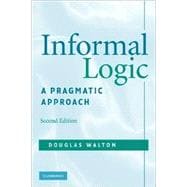
Note: Supplemental materials are not guaranteed with Rental or Used book purchases.
Purchase Benefits
| Preface | p. xi |
| Acknowledgments | p. xv |
| Argument as reasoned dialogue | p. 1 |
| Types of argumentative dialogue | p. 3 |
| Components of argumentative dialogue | p. 8 |
| Persuasion dialogue (critical discussion) | p. 10 |
| Negative rules of persuasion dialogue | p. 15 |
| Some major informal fallacies | p. 18 |
| The straw man fallacy | p. 22 |
| Argument from consequences | p. 24 |
| The critical perspective | p. 34 |
| Questions and answers in dialogue | p. 38 |
| Presuppositions of questions | p. 39 |
| Complex questions | p. 42 |
| Have you stopped abusing your spouse? | p. 46 |
| Disjunctive questions | p. 50 |
| Arguments from ignorance | p. 56 |
| Replying to a question with a question | p. 61 |
| Begging the question | p. 64 |
| Questions in polls | p. 67 |
| Advocacy and push polling | p. 71 |
| Question-answer rules in dialogue | p. 73 |
| Criticisms of irrelevance | p. 78 |
| Allegations of irrelevance | p. 79 |
| Global irrelevance | p. 82 |
| Question-answer relevance | p. 85 |
| Setting an agenda for a discussion | p. 88 |
| Red herring versus wrong conclusion | p. 92 |
| Varieties of criticisms of irrelevance | p. 99 |
| Summary | p. 102 |
| Appeals to emotion | p. 106 |
| Argumentum ad populum | p. 107 |
| The argument from popularity | p. 111 |
| Problems with appeals to popularity | p. 114 |
| Threatening appeals to force | p. 117 |
| Further ad baculum problems | p. 124 |
| Appeals to pity | p. 128 |
| Overt, pictorial appeals to pity | p. 130 |
| Summary | p. 133 |
| Valid arguments | p. 136 |
| Deductive validity | p. 137 |
| Identifying arguments | p. 138 |
| Validity as a semantic concept | p. 142 |
| Valid forms of argument | p. 144 |
| Invalid arguments | p. 149 |
| Inconsistency | p. 152 |
| Composition and division | p. 156 |
| Defeasible reasoning | p. 159 |
| Jumping to a conclusion | p. 162 |
| Summary | p. 166 |
| Personal attack in argumentation | p. 170 |
| The abusive ad hominem argument | p. 171 |
| The circumstantial ad hominem argument | p. 177 |
| The attack on an arguer's impartiality | p. 185 |
| Non-fallacious ad hominem arguments | p. 190 |
| Replying to a personal attack | p. 194 |
| Critical questions for an ad hominem argument | p. 198 |
| Important types of error to check | p. 201 |
| Some cases for further discussion | p. 203 |
| Appeals to authority | p. 209 |
| Reasonable appeals to authority | p. 211 |
| Argumentation scheme for appeal to expert opinion | p. 215 |
| Critical questions for the appeal to expert opinion | p. 217 |
| Three common errors in citing expert opinions | p. 223 |
| Evaluating appeals to expert opinion in written sources | p. 225 |
| Expert testimony in legal argumentation | p. 229 |
| How expert is the authority? | p. 232 |
| Interpreting what the expert said | p. 237 |
| A balanced view of argument from expert opinion | p. 241 |
| Inductive errors, bias, and fallacies | p. 246 |
| Meaningless and unknowable statistics | p. 247 |
| Sampling procedures | p. 251 |
| Insufficient and biased statistics | p. 254 |
| Questionable questions and definitions | p. 256 |
| The post hoc argument | p. 259 |
| Six kinds of post hoc errors | p. 263 |
| Bias due to defining variables | p. 270 |
| Post hoc criticisms as raising critical questions in an inquiry | p. 272 |
| Strengthening causal arguments by answering critical questions | p. 275 |
| Examples of drawing causal conclusions from scientific studies | p. 279 |
| Summary | p. 285 |
| Natural language argumentation | p. 289 |
| Ambiguity and vagueness | p. 290 |
| Loaded terms and question-begging language | p. 294 |
| Equivocation and amphiboly | p. 300 |
| Arguments based on analogy | p. 305 |
| Argumentative use of analogy | p. 308 |
| Criticizing arguments from analogy | p. 312 |
| Slippery slope arguments | p. 315 |
| Subtle equivocations | p. 321 |
| Variability of strictness of standards | p. 325 |
| Conclusions | p. 328 |
| Bibliography | p. 333 |
| Index | p. 339 |
| Table of Contents provided by Ingram. All Rights Reserved. |
The New copy of this book will include any supplemental materials advertised. Please check the title of the book to determine if it should include any access cards, study guides, lab manuals, CDs, etc.
The Used, Rental and eBook copies of this book are not guaranteed to include any supplemental materials. Typically, only the book itself is included. This is true even if the title states it includes any access cards, study guides, lab manuals, CDs, etc.